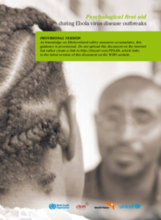Ebola virus disease outbreaks have a significant impact on the wellbeing of those affected, their family, community members and the health workers treating people with Ebola.
This guide focuses on psychological first aid, which involves humane, supportive and practical help to fellow human beings suffering serious crisis events. It is written for people who can help others experiencing an extremely distressing event.
This guide is an adaptation of the Psychological first aid: Guide for field workers (World Health Organization, War Trauma Foundation, World Vision International, 2011). It has been adapted to better respond to the challenges of Ebola virus disease outbreaks. Ebola poses specific problems for affected people (e.g., stigmatization, isolation, fear, and possible abandonment), their caregivers and responders (e.g., safety, access to updated information).
Psychological first aid has been recommended by many expert groups, including the Inter-Agency Standing Committee (IASC) and the Sphere Project. In 2009, the World Health Organization’s (WHO) mental health Gap Action Programme (mhGAP) Guideline Development Group evaluated the evidence for psychological first aid and psychological debriefing. It concluded that psychological first aid, rather than psychological debriefing, should be offered to people in severe distress following recent exposure to a traumatic event.
Endorsed by many international agencies, the original Psychological First Aid Guide reflects the emerging science and international consensus on how to support people in the immediate aftermath of extremely stressful events.

